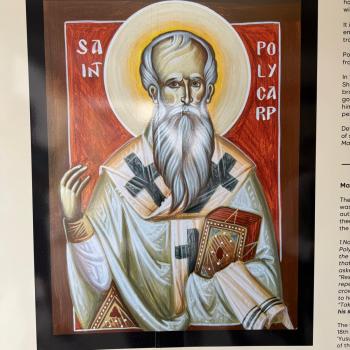Q. What has always struck me about that Romerbrief is that apart from the strong emphasis on the absolute transcendence of God (he is not part of creation but qualitatively distinct from it), and therefore the absolute necessity of the divine initiative in revelation for salvation, much less a reconciled relationship with God, this commentary doesn’t much sound like Paul. It sounds like abstract philosophical speculation about God, revelation, etc. Paul doesn’t do such speculation about God’s transcendence. He simply assumes the existence of the Biblical God and argues from that. In fact, Paul in Rom. 1 does the very thing Barth has problems with— he says that the reality of the true God and his power is knowable through examining creation. In the Brunner vs. Barth debate, Brunner has the better of this one. It’s just that Paul doesn’t think such knowledge from general revelation can save fallen human beings. It requires special revelation. And there is one more thing. Paul thinks that the divine nature is not veiled in Christ’s humanity, it is revealed in it, if by that we mean the very character of God as love, light, life, mercy, grace, holiness, etc. Barth all sounds to me too much like the Deus Absconditus of Luther, the hidden God, rather than the God that reveals himself in Christ.
The publication of the 2nd edition of the Romerbrief certainly was a game changer, not only for students of theology, but for Barth himself. The real question is how did it affect his own faith in God, his own Christian practice, his own preaching, his own relationships with other people? What do we know about that?
A. Barth, of course, later poked fun at himself for the extremism of his commentary on Romans. So I don’t know that he continued to stand by many of his assertions. But some of them, yes–like his rejection of the notion that we can understand something of God from natural revelation. Barth knew perfectly well that lots of people, and most other religions, had conceptions of God grounded in what they could perceive in nature, and that many of those conceptions coincided with the God revealed in Jesus Christ. He wasn’t ignorant about this reality. But I think he would argue that these perceptions in nature cannot ground any real understanding of God precisely because they cannot bring Christ into the picture. And if you cannot bring Christ into the picture, you are automatically fabricating a God based on experience and reason, and this cannot help but lead to idolatry.
The fact that people posit attributes of God from natural theology that coincide with the Christian picture (God as creator, for example) is sometimes wishful thinking (as in Feuerbach) or a coincidence or a refusal to see the big picture. We like to point to the incredible beauty and magnificence of nature, while ignoring the horrific “red in tooth and claw” reality that reverberates all through it. If God created the one, by the logic of natural theology, he must have created the other, and you are picking and choosing the god you wish to believe in. At best, creation is ambiguous about who God is or if he even exists. So I think as a theological matter, Barth is right on this point.
When it comes to exegeting Paul on this point, things are a little more complicated, of course. Paul’s overall theology would suggest that any god we come up with by natural theology will be one we have no real interest in loving or serving, and thus the degeneration into all manner of idolatry and immorality as he describes. Speaking personally, I don’t know that Paul is talking about individuals in that passage or the entire human race —as in, in the beginning, before the transgression of Adam, there was some knowledge of God in the natural order of things. Adam–humankind as a whole–has rejected that knowledge so that today we all live in ignorance outside of Christ, and thus will degenerate into idolatry and immorality.
I’m not sure this is how Barth would argue it, and I don’t expect everyone to agree on this point. I just think it is a valid theological approach for us to ponder and explore. It does, in fact, suggest some truths about the human condition that natural theology cannot explain. And it puts a hedge around all the language in the New Testament that suggests that outside Christ, all is darkness (especially in John).
Q. Barth is, understandably hard on ‘religion’, the human attempt to be reconciled to God through various religious means. This is especially understandable in the light of the co-opting of religion in Germany during both world wars. Religion is not a means of salvation (which sounds like an attack on the phrase ‘the means of grace’), religion in Barth’s view is like the tower of Babel. The problem again with this, is the OT, in this case doesn’t think so. The whole book of Leviticus talks about means by which human beings can be reconciled to God through sacrifices of various sorts. For all his ‘Scripture’ centered attack on religion, he doesn’t seem to realize he is also attacking various parts of Scripture. Part of this is that he has an allergic reaction to ‘realized eschatology’, to for example the very things Paul talks about in Rom. 5— namely that we have peace with God NOW, not just in the future. What was it in his own life that made him so resistant to the assertions not just of pietism, but of Paul himself that we have assurance, peace with God, love and experience those things now?
A. He is certainly not allergic to Paul saying we have peace with God right now. But that peace is not primarily an experience, but a fact: God was in Christ, reconciling the world. It is finished. We have peace with God. End of conversation.
But of course that is not realized today in any consistent way. Somedays we experience that peace, other days we don’t. But we still have peace with God no matter what. Some days we feel assured, other days we don’t. But Christ’s words (not our feelings) are what we depend on.
Again, Barth is smart enough to know that you cannot have Christianity without religion, that is, without the church. And you cannot have a church without religious symbols, rituals, actions, etc. His point is that we are tempted mightily to begin to imagine that those very things designed to bolster and strengthen our faith becomes objects in themselves, so that one measures one’s faith by one’s faithfulness to the external trappings. That is nothing less than idolatry. I don’t think this is an unusual notion in Protestant history and theology, or to acknowledge that the church faces this temptation in every era.













